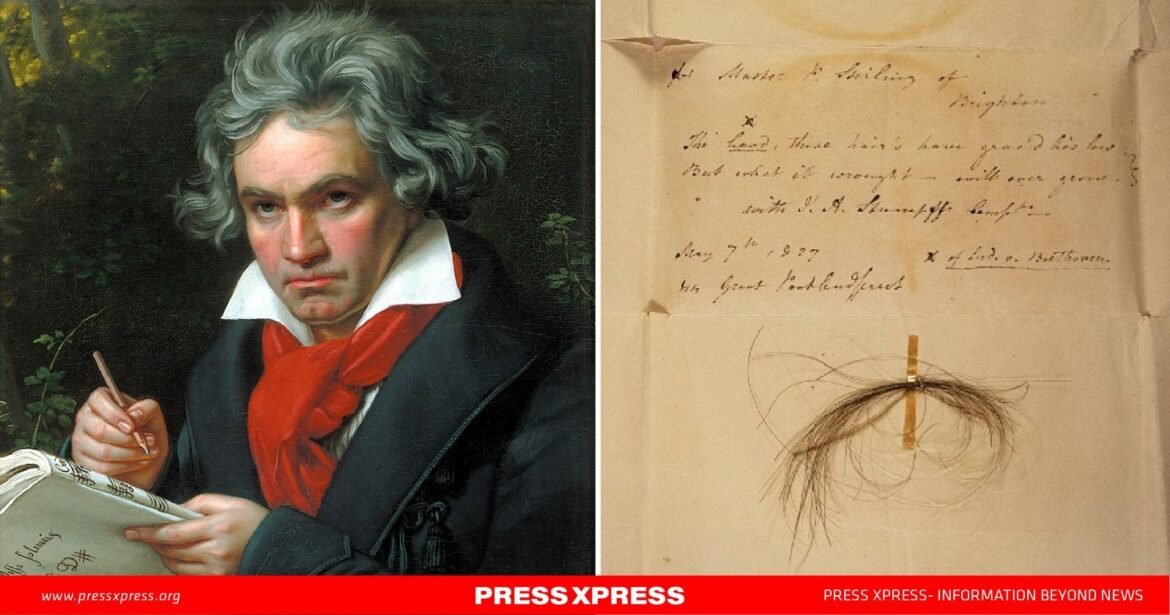Ludwig van Beethoven, the German composer behind iconic works like Symphony No. 5 and Ode to Joy, left an indelible mark on classical music. Known for his powerful, emotionally charged compositions, Beethoven’s legacy continues to captivate audiences nearly 200 years after his death. But beyond his groundbreaking music, Beethoven’s life was filled with personal battles—most famously, his tragic loss of hearing.
In March 1827, as Beethoven lay bedridden with jaundice and swollen limbs, he asked that his health conditions be shared with the public. Today, with modern DNA analysis, scientists have honored his wish, unraveling details about his health through a series of preserved hair samples.
Unraveling Beethoven’s Health Mysteries
Beethoven began experiencing hearing loss in his mid-20s, eventually becoming almost completely deaf by 1818. Despite countless theories, no definitive cause was ever confirmed by his doctors. In 2007, a forensic study suggested that lead poisoning might have contributed to his decline. This theory, based on an analysis of what was believed to be Beethoven’s hair, raised questions due to the prevalence of lead in the medical treatments and drinking vessels of his time.

However, in 2023, a groundbreaking study conducted by biochemist Johannes Krause at the Max Planck Institute for Evolutionary Anthropology found that the hair sample analyzed in 2007 was actually from an unknown woman, not Beethoven. The team used authenticated hair locks, confirming that Beethoven had a chronic hepatitis B infection—a likely contributor to his liver disease and premature death at 56.
More Than Just Hearing Loss?
Hearing loss wasn’t Beethoven’s only affliction; he also struggled with abdominal pain and gastrointestinal distress from his early 20s. Despite speculation that his symptoms might stem from lead exposure, the recent DNA analysis found no evidence of lead poisoning. Instead, researchers attribute his liver issues to the hepatitis B infection and note that Beethoven’s drinking habits may have worsened his condition. The root cause of his abdominal pain and deafness remains a mystery, as genetic clues failed to reveal answers to these issues.
A Surprising Family Secret Uncovered!
Beethoven’s DNA analysis led to a revelation no one expected—a potential case of infidelity in his family line. By comparing Beethoven’s Y chromosome to that of living descendants, scientists discovered inconsistencies suggesting an ‘extrapair paternity event’. This discovery indicates that one of Beethoven’s paternal ancestors fathered a child outside of marriage sometime between 1572 and 1770, seven generations before Beethoven’s birth. This revelation adds a surprising twist to his family’s history, suggesting Beethoven may not have been a genetic Beethoven by strict paternal lineage.

Lingering Questions About Beethoven’s Life
Despite modern science’s efforts, some aspects of Beethoven’s life remain unsolved. Scientists couldn’t find genetic markers to explain his hearing loss or abdominal issues. It’s unclear where Beethoven contracted hepatitis B or how a woman’s hair came to be mistaken for his. While the findings shed light on his liver condition, they leave much of his health puzzle incomplete, highlighting the limits of genetic research on historical figures.
Lastly, Beethoven’s request to share his health story has been fulfilled in ways he could never have anticipated. His DNA has not only provided insight into his final years but has also uncovered an unexpected chapter in his family’s history!


